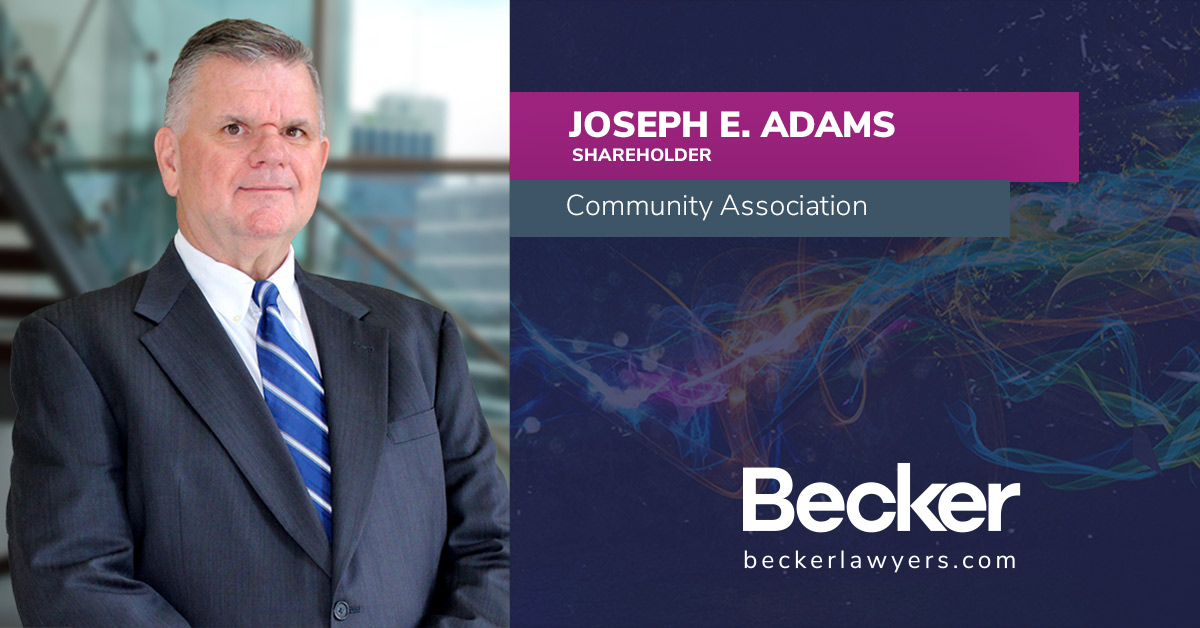“Community Associations Affected by the 2021 Legislative Session Part XI” – News-Press

This week concludes our review of the 2021 legislative changes by reporting on a number of miscellaneous bills that may have indirect applicability to community associations.
House Bill 403, relating to home-based businesses, became effective on July 1, 2021. The new law specifies conditions under which a business is considered a “home-based business,” provides requirements for home-based businesses, authorizes a home-based business to operate in an area zoned for residential use, specifies that home-based businesses are subject to certain business taxes, and provides prohibitions and authorizations for local governmental actions relating to home-based businesses. Importantly, this bill does not supersede any current or future declaration of condominium adopted pursuant to chapter 718, cooperative document adopted pursuant to chapter 719, or declaration of covenants adopted pursuant to chapter 720. Prohibitions on commercial use in such documents would still be enforceable, although the new law does not speak to rules and regulations.
Senate Bill 76, relating to insurance, became effective July 1, 2021. This law prohibits certain practices by contractors, including prohibiting a contractor from executing a contract with a residential property owner for a roofing repair or replacement unless the contract contains a notice that the contractor may not engage in the practices prohibited by the statute, which include offering the owner of a residential property a rebate, gift, gift card, cash, coupon, waiver of insurance deductible, or any other thing of value, in exchange for allowing the contractor to inspect their roof or make an insurance claim for their roof.
Senate Bill 1954, relating to statewide flooding and sea level rise resilience, became effective on May 12, 2021. The new law establishes the “Resilient Florida Grant Program” within the Department of Environmental Protection and requires the department to complete a comprehensive statewide flood vulnerability and sea level rise data set and assessment by specified dates. The law also requires the department to develop an annual “Statewide Flooding and Sea Level Rise Resilience Plan,” and to submit the plan to the Governor and Legislature each year. The law also requires the department to implement a scoring system for assessing projects eligible for inclusion in the plan.
House Bill 483, relating to electronic legal documents, became effective on June 29, 2021. The bill clarifies that supervising the witnessing of an electronic record by an online notary public is a “notarial act” and modifies witnessing procedures. The new law also revises the statutory forms for affidavits for acceptance of and reliance upon powers of attorney, for notices of election relating to descent of homestead property, and for self-proof of wills or codicils. The changes made by this act are stated to be “remedial” in nature and apply retroactively to January 1, 2020.
In addition to the numerous bills which affected community associations, there were also a few notable bills which did not pass. These are worthy of keeping an eye on, as issues addressed in failed legislation often arise in subsequent years. These proposals included a bill that would regulate investments by condominium associations, a bill increasing the vote required to recall homeowners’ association board members, a bill creating a pilot program to detect fraud in condominium associations, a bill which would have prohibited local governments from regulating vacation rentals, and a bill effecting the applicability of homeowners’ association amendments related to rental agreements, which was broader than the bill that actually passed and was reported in an earlier edition of this column.
Without a doubt, 2021 was one of the most active years in recent memory as far as changes to community association laws. As usual, there was the good, the bad and the ugly, but on balance I would personally rate the changes as helpful on the whole.
Next week’s column will return to our normal question and answer format.
Joseph Adams is a Board Certified Specialist in Condominium and Planned Development Law, and an Office Managing Shareholder with Becker & Poliakoff. Please send your community association legal questions to jadams@beckerlawyers.com. Past editions of the Q&A may be viewed at floridacondohoalawblog.com.





